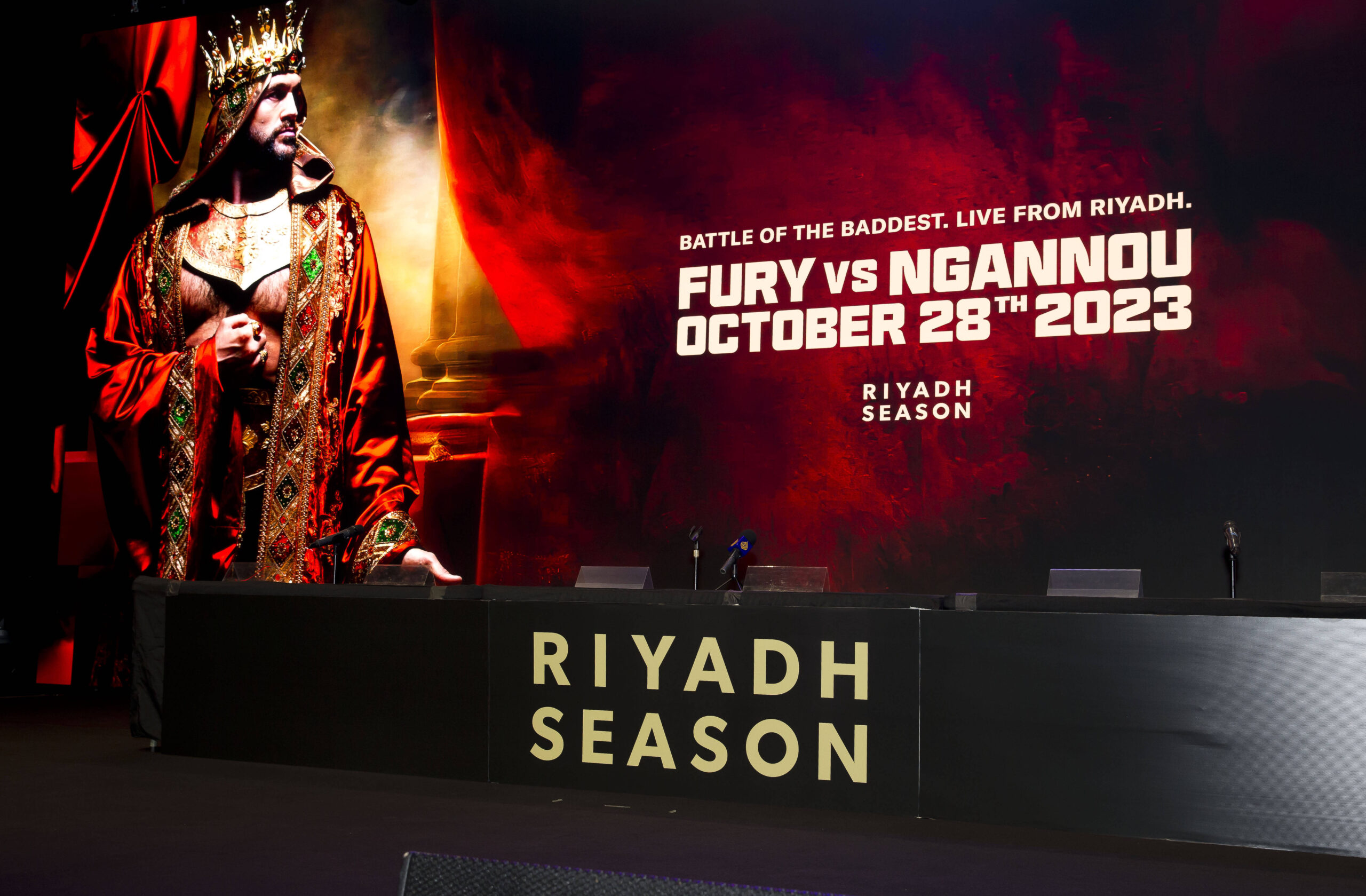Jump to
This feature first appeared on The Bloody Elbow Substack.
Forgive us for being intrigued by a bunch of MMA promoters chasing oil money like a slobbering bunch of Beverly Hillbillies.
2023 has given us two major storylines involving the Haves (WWE & UFC merging into TKO) and the Have Nots (everyone else chasing the oil money). If you’re fighting for dollars in an industry dominated by a monstrous $14 billion dollar operation, you could be excused in your search for fast money.
Three recent November 2023 stories involving PFL, ONE, and RIZIN adventures in the Middle East reveal some hard truths regarding the size and scope of Oil Money investment in the Mixed Martial Arts space.
The sheer lust for oil money
As the UFC prepares to go to trial to fight off antitrust claims in a Las Vegas Federal courtroom, everyone else in combat sports is scrambling to grab as much investor cash as possible. Why? The barriers of entry to get into the business and finance operations are rapidly escalating.
TKO’s control of market share is astounding. Tony Khan’s spending on AEW creates market distortion through the sheer breathtaking volume of money he’s spending — hundreds of millions of dollars.
Stagflation is a real pain in the ass. Higher-for-longer interest rates makes debt financing more of a challenge. Another wildcard? If there’s a global recession, that’s bad news for oil prices due to demand destruction. It may help with inflationary pressure but it certainly won’t help if you’re a promoter trying to grab as much oil money as possible for your fight investments. This is why the speed and scope of mergers and acquisitions in the combat sports arena has been so hard to interpret and comprehend. You’re not dumb for having difficulty processing what’s going on. We are witnessing games of high finance on a level that looks a little like the 2007 housing bubble.
RIZIN to the occasion in Azerbaijan
In Japanese circles, the lust for oil money has been irresistible. A Who’s Who of promoters, television executives, programmers, fighters, and media writers have been dreaming nonstop about oil money. With a generation of yakuza cash getting limited as a promotional lifeline, there have been quite a few retired fighters and Youtubers who have publicly made their motives known about accessing oil money to finance future fights.
The boxing match between Francis Ngannou and Tyson Fury provided the visualization of those dreams with the Japanese. The pomp and circumstance motivated a sense of confirmation bias. Why not us?
The politics of fossil fuels has always been a very sensitive and complicated subject with the Japanese government. They have heavily relied on imports of oil from Russia and Iran. However, Tokyo is also aligned closely with Washington D.C. and has been enforcing US sanctions on Iranian assets.
Japan shares similar values to Washington in terms of green energy policy. Japan has a lot at stake in executing a transition from a fossil fuel economy to a green economy. That transition was heavily complicated by the Fukushima nuclear plant disaster in 2011. Nuclear energy is a key component in a transition to a cleaner energy policy. The race to develop better nuclear fusion technology would change everything.
Until a transition can be fully executed, fossil fuels remains king. Which means Japan has a lot of experience in terms of pragmatic, situational ethics in regards to oil money from places like the Middle East. One of those oil partners is Azerbaijan.
Azerbaijan is next door neighbors to Russia and Iran on the Caspian Sea. When people talk about Caspian oil money, they’re talking about Azerbaijan and its capital Baku. In chasing oil money from Baku, it means you are navigating the conflict between Azerbaijan and Armenia. Good luck with that.
The United States Senate, last week, unanimously passed a bill called the Armenian Protection Act that would prevent President Joe Biden from giving US money to Azerbaijan for the next two years. What that means in regards to Tokyo’s politics with Baku remains to be seen.
In the race to chase oil money, RIZIN leader Nobuyuki Sakakibara negotiated a sold show with Azerbaijan diplomats. He brought a RIZIN event to Baku. Baku has two things that a Japanese fight promoter loves: resources and judokas.
Baku recently hosted a grand slam Judo tournament event. The growing footprint for Judo in the country is grabbing international attention. Now you could see why RIZIN wanted to grab a piece of the action. Recruiting top foreign talent while getting paid and generating new business leads in an oil market flush with cash.
RIZIN’s debut event in Baku featured a main event of Chihiro Suzuki vs. Vugar Karamov. It was the perfect outcome for RIZIN. Karamov had Suzuki down and was ready to pounce … only to get high kicked by Suzuki on his back and get knocked out while in top position. Everyone was stunned. It was a great visual to air back home in Japan of a new hero who inexplicably shocked the world.
The strong desire for RIZIN to return to Baku is evident. You could see why when watching highlights from the November event. You could also see why Azerbaijan would want to use its wealth to negotiate a deal with RIZIN to develop a talent pipeline.
The pesky problem is that world politics gets in the way. With new US aid policy targeting Azerbaijan, we will see how both Baku and Tokyo navigate these waters. Baku investment in RIZIN makes sense as a buy-low investment. If international pressure, especially from Washington D.C., is placed on Japan to minimize ties with Azerbaijan, what will that mean for RIZIN? Oil money is not so easy.
ONE more lifeline from Qatar?
While RIZIN delivered a good show for their partners in Baku, Chatri Sityodtong and ONE are reportedly facing their own oil money adventures.
Kristie Neo at Deal Street Asia has published two key articles regarding ONE over the last three years that have given the public some clues on the sheer amount of financing to feed the promotional beast.
In September of 2021, DSA published an article titled ONE Championship generated $341m profit in FY2020 from asset sale to subsidiary. In November of 2023, DSA published an article titled ONE Championship said to have made new pitch to [Qatar] for extra funding.
In combination with the excellent work from Team Bloody Elbow on the eye-opening expenditures by ONE Championship, you would not be alone in having your jaw drop at what kind of investment and capital is needed for ONE to sustain a path for growth.
In an interview with CNBC International on Tuesday, Chatri laid out plans for ONE events in Japan, Qatar, and the United States in 2024. Strangely, CNBC did not post the interview on their Youtube channel. Instead, a one minute clip is available on their web site. That one minute clip, unfortunately for ONE, contained this visual:

As you might have noticed in the one minute video clip, Chatri is asked about whether or not ONE Championship can be profitable. He answers the question by focusing on lowering ONE’s burn rate and increasing revenues. Revenue is not profit, however. Now you can see why BE’s recent focus on ONE fighter contracts and Intellectual Property rights is a legitimate avenue of business interest. What is there for ONE to sell to oligarchs and global investors?
We focus on this CNBC clip because DealStreetAsia reported that ONE is trying to fundraise more cash from Qatar. What are they thinking right now?
DSA reported that the cost to produce a ONE event in Qatar would be $6 million dollars. How? Why? Furthermore, DSA noted that the event was supposed to be underwritten by Media City Qatar, Qatar Airways and Ooredoo. Will they still finance the show?
In this largely unnoticed CNBC International video clip from a few months ago, there is discussion from ONE about a second MOU (Memorandum of Understanding) with Qatar Media City and tie-ins with beIN Sports. When pressed by CNBC on a timeline for profitability, Hua Fung Teh predicts it will take two to three years before ONE is profitable. If you want a glimpse of what it’s like seeing ONE execute a sales pitch with investors, watch this video from the Invest in Sports 2023 meeting last month in New York City.
With UFC’s strong connections to Abu Dhabi, PFL working with Saudi Arabia, and RIZIN tying up with Azerbaijan, ONE is going to face a more challenging fundraising climate in 2024. Will the oil money still be there for them? The event in Qatar could end up making or breaking everything as a showcase event to the rich.
If your head is spinning at all of the reported accounting and paper transactions made by ONE Championship to make the business model attractive to investment, wait until you see what Bellator has turned into.
PFL MMA and Paramount turn Bellator into an accounting asset
When you strip out the signal from the noise by Donn Davis and PFL, the (minimal) details regarding their acquisition of Bellator from Paramount appears to be more of a story about big hype over big fundamentals.
Mr. Davis announced that PFL obtained Bellator assets from Paramount in an all-stock deal. No cash changed hands. No oil money?
It’s not uncommon to see a mixture of cash + stock in a merger or acquisition. Occasionally, you will see an all-stock deal if there’s a growth property or if the parties involved have a lot of money (e.g. see Chevron taking over Hess).
But an all-stock deal between PFL and Paramount for Bellator?
Mr. Davis repeatedly told the press on Tuesday that the deal was a scenario where all the parties involved had high upside and potential. As Damon Martin at SB Nation asked, what potential is there in buying a money loser? This is where an all-stock deal provides an opportunity for both sides to flex their accounting + marketing muscle.
Cash versus stock value (taxation)
An all-stock deal hypothetically allows Paramount to calculate a different valuation of the Bellator assets on their books rather than selling the Bellator assets purely for cash. It’s perfectly legal and it makes a lot of sense. Why receive a pittance in cash for Bellator assets from a disinterested buyer when you can calculate a higher valuation on the Bellator assets and not immediately pay taxes in an all-stock deal?
Bellator’s assets are worth more to PFL than they are worth to another party, like UFC. What UFC would offer in cash may not be as much as what PFL could offer in stock. The only question for Paramount is what’s the better deal. An M & A agreement based on an all-stock transaction is why Paramount wanted to conduct proper due diligence on PFL’s financials.
By (hypothetically) assigning a different valuation for Bellator on the books, Paramount can take advantage of future capital gains or losses in accounting when they divest from the PFL stock received in the deal. Most importantly, the all-stock deal allows them to save face.
PFL, meanwhile, is giving stock away in their company to Paramount but is also increasing it’s overall company value in the market simultaneously. Nobody likes diluting ownership shares in a company but an acquisition like PFL grabbing Bellator changes market share immediately while also acquiring skilled labor with fighter contracts.
For PFL, an all-stock deal makes a lot of sense because they don’t have to spend investment money received from Saudi Arabia. That money was reportedly earmarked for MENA (Middle East/North Africa) events. If you can’t touch that money to buy out Bellator, how else would they finance the purchase? Rather than get on the hamster wheel once again to chase money, an all-stock deal gives PFL a chance to consolidate assets in the market without increasing their burn rate. It’s their smartest play.
PFL’s all-stock deal with Paramount for Bellator bears no resemblance to the UFC + WWE merger under the TKO umbrella. The TKO merger was executed using a financial technique called a Reverse Morris Trust, which requires both companies to be profitable for the last five years and be of similar size in order to be able to spin off valuable assets into a new company for deferred taxation.
Indemnification
A big part of an all-stock deal, especially with Paramount maintaining a minority stake in the operation, is indemnification. How does Paramount make a deal in such a way where they can get upside while limiting exposure to any sort of future PFL liability?
If you want to go down the legalese on the indemnification rabbit hole, read this Thomson Reuters Practical Law article.
We did not hear specifically any information from PFL on Tuesday regarding how much Paramount valued the Bellator asset in their all-stock transaction. We also did not hear any specific information regarding the indemnification agreement(s) between both parties. This is a key and critical point to focus on, especially if you’re in the media and you’re asking questions to the parties involved.
How did Paramount’s attorneys approve a deal where they can maximize taxation issues while also hammering out indemnification provisions? Did they become, in essence, a Limited Partner thanks to the all-stock agreement?
Assignment of fighter contracts
If you lived through the time period where UFC acquired the assets of PRIDE, you know where I’m going with this. A key motivation for UFC in obtaining the PRIDE assets was getting first access to top fighters.
What UFC discovered, however, is that the kinds of contracts PRIDE had with fighters resembled Personal Service Agreements. Plus, PRIDE often contracted out with teams and gyms to access a group of fighters rather than hardened individual contracts.
In the UFC/PRIDE asset deal, there was immediate concern regarding the legality of third-party assignment issues and Zuffa had to write up some new contracts for fighters to sign. Any time you are dealing with international business parties, especially in the fight business, contract law wildly varies. This is why the all-stock deal between PFL and Paramount for Bellator, with Paramount maintaining a minority share, makes a lot of sense in terms of possible legal protection of the fighter contracts involved. That doesn’t mean that there won’t be any legal challenges, per se, but having Paramount still on-board might assuage assignment concerns.
The value of financing
For both PFL and Paramount, an all-stock deal for the Bellator assets allows both parties to raise capital if needed based on the new asset.
If Paramount wants to use their stake with PFL for financing, they absolutely can do so. They can also divest and deal with whatever capital gain or loss there is. Paramount’s decision to maintain a minority stake in Bellator is a form of insurance.
For PFL, franchising is a mechanism for fundraising. In speaking to Ariel Helwani on Tuesday, Donn Davis elaborated on the five franchises PFL has right now: PFL League Series (America), PFL PPV Superfight series, PPV Challengers series, PFL International League series, and now Bellator. Mr. Davis noted that Bellator and PFL would remain separate for the time because of commercial agreements that supposed require exclusivity. That makes a lot of sense.
What also makes a lot of sense is the concept PFL is going to try to sell to future investors. You may not want to buy into PFL but you might want to buy a piece of a tournament or a show series. Theoretically speaking, it makes some sense to try to raise capital by investing in shows or franchises rather than investing in the parent company itself. Some franchises might lose a lot of money and some franchises might generate small revenue. Piece-mealing financing makes some short-term sense for PFL.
The problem, long-term, is that PFL is going to need significant expenditure to make a splash. Currently, the story of PFL is a process story rather than a story about substance. Like ONE, it’s a story about high finance and interest outside of the cage rather than interest in the product that’s being promoted. At some point, the hamster wheel stops and you have to deliver.
The question is: what choice does PFL have in terms of their current marketing pitch? They have to sell themselves as Pepsi to UFC’s Coca Cola. To attract capital, especially oil money, they have to convince everyone that they will be the number two in a combat sports space that often just rewards number one due to monopolistic or monopsonic business practices.
The all-stock transaction allows PFL to increase market share without spending capital. Eventually they’re going to have to spend capital and do so on a parallel track. One track will be juggling revenue and profit while the second track involves a constant hustle to obtain new financing.
In the hype for oil money, expect the rich to get richer
Bet on TKO (WWE + UFC) to win the oil money sweepstakes.
Ari Emanuel’s relationship with Abu Dhabi and Mubadala Investment Co. means everything for both Endeavor and TKO. Ari already has First Mover status in the market. Don’t expect his footprint to shrink any time soon.
PFL is a vehicle that will allow Saudi Arabia to get a peek behind the curtain on how the financing and machinations of the Mixed Martial Arts space looks. They have reportedly committed $100 million dollars to PFL. That doesn’t mean they are obligated to commit more. They may be interested, but now it’s up to PFL to demonstrate a convincing reason to invest more money. PFL has to convince future business partners to invest in them, not UFC. They have to convince investors that they can gain enough market share to create their own dream monopsony. Otherwise, why not just invest big money in UFC?
What the RIZIN, ONE, and PFL deals this past month show is that there is a limit to what you can get with oil money. There are strings attached. The question has always been what the ceiling is for oil money in MMA. Right now, the public evidence shows that the hype over oil money financing major events doesn’t match the various dreams and promises being sold both publicly and privately by those in combat sports outside of TKO.
Bloody Elbow merch available
Bloody Elbow is pleased to announce our partnership with Revgear. They have been a pioneer in the MMA gear industry and have grown into a formidable brand and true leader in the market. Revgear now have Bloody Elbow t-shirts, hoodies and hats so you can show your support for independent MMA journalism.

Thank you for reading this article. Please consider subscribing to the Bloody Elbow Substack to enjoy our daily premium content. Your paid subscriptions are helping build our new site and keeping hope alive that our staff will remain intact. If you haven’t already, please pledge with a paid subscription today.
Join the new Bloody Elbow
Our Substack is where we feature the work of writers like Zach Arnold, John Nash and Connor Reubusch. We’re fighting for the sport, the fighters and the fans. Please help us by subscribing today.
About the author




